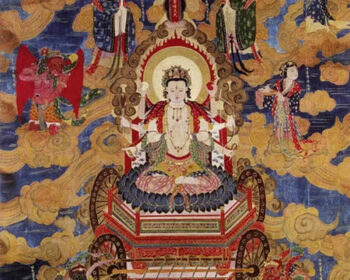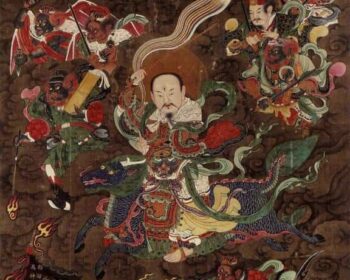The secont part will introduce more items and accessories in detail and give historical background informations.
Read more

The secont part will introduce more items and accessories in detail and give historical background informations.
Read more
A deep insight into daoist headwear and hair styles, introduction of the items and accessories in detail and historical background informations.
Read more

太上玄门早坛功课经 Tài Shàng Xuán Mén Zǎo Tán Gōng Kè Jīng 澄清韵Chéng qīng yùn 琳琅振响,十方肃清,河海静默, Lín láng zhèn xiǎng, shí fāng sù qīng, hé hǎi jìng mò, 山岳吞烟。万灵镇伏,招集群仙。 Shān yuè tūn yān. Wàn líng zhèn fú, zhāo jí qún xiān. 天无氛秽,地无妖尘。冥慧洞清, Tiān wú
Read more
太上玄门晚坛功课经 Tài Shàng Xuán Mén Wǎn Tán Gōng Kè Jīng 步虚Bù xū 大道洞玄虚,有念无不契。炼质入仙真,遂成金刚体。 Dà dào dòng xuán xū, yǒu niàn wú bù qì. Liàn zhì rù xiān zhēn, suì chéng jīn gāng tǐ. 超度三界难,地狱五苦解。悉归太上经,静念稽首礼。 Chāo
Read more
白鹤飞Bái hè fēi 道场启,法筵开,稽首皈依天地水,仙家乐白鹤飞。 Dào chǎng qǐ, fǎ yán kāi, qǐ shǒu guī yī tiān dì shuǐ, xiān jiā lè bái hè fēi. 道场启,法筵开,三官大帝慈悲主,仙家乐白鹤飞。 Dào chǎng qǐ, fǎ yán kāi, sān guān dà dì cí bēi
Read more
步虚Bù Xū 照耀开明炬,氤氲岛慧香。经尘归紫极, Zhào yào kāi míng jù, yīn yūn dǎo huì xiāng. Jīng chén guī zǐ jí, 元气合元皇。台座辉三级,罡光射七芒。 Yuán qì hé yuán huáng. Tái zuò huī sān jí, gāng guāng shè qī máng. 皈真知命处,福寿自然长。
Read more
元始天尊说北方真武妙经 Yuán Shǐ Tiān Zūn Shuō Běi Fāng Zhēn Wǔ Miào Jīng 步虚Bù xū 训自天尊行,行本彻太清, Xùn zì tiān zūn xíng, xíng běn chè tài qīng, 清静详光现,现出大天尊。 Qīng jìng xiáng guāng xiàn, Xiàn chū dà tiān zūn. 金闕化身天尊 Jīn què huà shēn tiān
Read more
九天应元雷声普化天尊玉枢宝经 Jiǔ Tiān Yìng Yuán Léi Shēng Pǔ Huà Tiān Zūn Yù Shū Bǎo Jīng 步虚Bù xū 九天应元炁,歘火是真形。雷声开祖劫, Jiǔ tiān yìng yuán qì, chuā huǒ shì zhēn xíng. Léi shēng kāi zǔ jié, 闪电烛幽冥。神通示变化,圣德冠群灵。 Shǎn diàn zhú yōu míng. Shén tōng shì
Read more
“Shao-Yang Di-Jun” is first of the Wu Zu (the Five Patriarchs). His name was Wang Cheng, lived around the 4th to 5th century. Wang Cheng is said to be a direct student of Laozi.
Read more